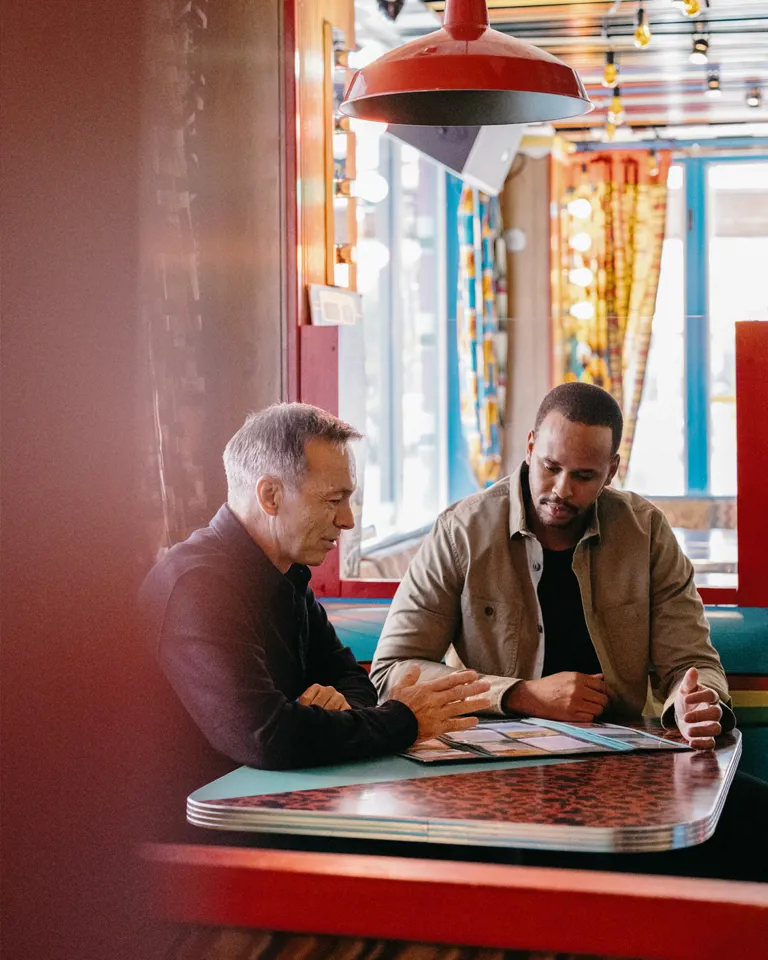A mental packing list of sorts, The Good Traveler lays out our aspirations on the path to becoming more respectful, considerate travelers. To learn how these ideas can shift and shape our journeys, we have invited ten travelers we admire to go into the world and explore each tenet throughout 2023.

Words Juliet KinsmanIllustrations Estefania Loret de MolaDate 16 January 2023
I’m closing my eyes to recall my most stirring travel memories. As it happens, the most precious recollections that percolate back are the most prosaic. They’re exchanges with people living a simple, humble life, starkly different from mine. In one vision, a tea picker’s toothless but sincerely beautiful smile in Sri Lanka stimulates a yearning to be back on the steep slope of densely planted bushes. I was introduced by the boatman at my Lake Koggala hotel to his mother. We shared no common words, yet her pausing her plucking to reach over the leaves and affectionately squeeze this stranger’s hand gave me butterflies.

Nostalgia resurfaces in tidal waves, too, when I stop and think about how much I loved rattling along in the back of a pick-up in Costa Rica, heading up to the jungle from the Caribbean coast to a remote Bribri community. I was tagging along with my hotel’s maintenance team as they delivered roofing materials for an Indigenous woman parenting three girls solo in a place where electricity cables and sanitation has yet to arrive. Our dusty, bumpy track segued into a river crossing. Arriving at the village of huts, our welcome party included a noisy pig, a turkey, a swarm of just-hatched chicks, and some puppies. As the guys grunted and sweat carrying up the building supplies, I attempted a little conversation in the shade of some palms. Through interpretation, I gleaned that it’s not unusual for abusive husbands to abscond and leave parenting to the women. This mother dreamt of returning to school, determined to finish her studies and become a psychologist. As different as the context was, here at her thatched open-air home on stilts, her toilet, a shed in the foliage, her dreams were no different from how they might be if she lived in the flat above me in West London. She thanked me sincerely for taking the time to visit and hear her story. Clearly, the privilege had been mine.
a writer, author, and the first Sustainability Editor of Condé Nast Traveller. Her new podcast series, Funny Old World for the eco-curious, is available on Apple and Spotify. She is the author of The Bucket List Eco Experiences: Traveling the World and The Green Edit: Travel—Easy Tips for the Eco-Friendly Traveller.
A 14th-century origin of “respect” is to regard or show consideration—taken from old French and Latin, it means, quite literally, to look back at. This developed into denoting feelings of esteem. In terms of travel, I see it lending its name to a way of exploring that has us at eye level with everyone we meet. It whispers to us to do away with deference and servitude and to favor an appreciation for valuing deeper connections with unfamiliar cultures. And to remember at all times that all of humanity has the same needs, hopes, dreams—but we are the visitors. Is “responsible” or “regenerative” the better term? Whatever terms we choose, we will do well to ensure our presence is never part of a negative fallout from our being on the move. Picture a great-grandparent looking on, ensuring we mind our manners.
This extends to an appreciation for hotels that are proactively doing good for people and place. “Respectful” is shorthand for businesses that are protective of nature and passionate about reviving communities, with a concern for what happens upstream as well as downstream. It speaks to spending money in a way that doesn’t just benefit just me, but the we. Hoteliers I’ve loved hearing from in this way include softly spoken Tara Medina, who has worked hard with Andrés Saavedra to make sure Musa in Mexico helps earn a new reputation for Guerrero thanks to their meaningful collaborations with musicians and artists. Paul Salmon of Rockhouse Hotel has always shown deep solidarity with his Jamaican community since creating his beach hotel in Negril in 1994. His foundation has raised around $7 million, which has been put towards local schooling to elevate the next generation on this Caribbean island. We need more hosts that allow us as visitors to honor our intentions of remaining humble and respectful as we roam while indulging our wanderlust.

Paul Salmon has shown deep solidarity with the Jamaican community since he opened Rockhouse Hotel in 1994.
Travelling has always been my normal. My father was a career diplomat, and just after I was born in Ottawa, our family was posted to Algeria. As part of our Canadian foreign service relocation journey to North Africa, we took a boat to Marseille. My parents picked up the Fiat they’d ordered in “Champagne” color (“more like canary yellow” my mum would complain for years). They propped me up on a pile of suitcases in its back seat and off we went by ferry, then road, to our new home. My mental hard drive won’t release any visual memories of our life in Algiers. Still, if I catch a waft of couscous spices, my hippocampus and olfactory bulb will unlock an evocative scent memory. My mum died when I was barely a teenager, but I’m told she loved immersing us in authentic Berber culture and exploring the Mahgreb rather than only playing tennis with French speakers at the club for ex-pats.
Spending time in new places has since always felt exciting, allowing new visuals and sounds to register with my senses. I can’t remember people’s names, but I remember every detail about seemingly banal moments in high definition. Sunlight playing with palm fronds and casting dancing shadows on an azure pool. Clumsily ordering local pastry specialties from a hole-in-the-wall baker. An awkward exchange at a traditional local kiosk, I’ve learned, can feel uncomfortable but just as I start to contract, I remind myself it’s these junctures that give way to the most special imprints in our inner travelogues, and in turn, we expand.

Tara Medina and Andrés Saavedra Benítez ensure Hotelito enriches Guerrero, Mexico, through meaningful collaborations with musicians and artists.

Proselytizing about traveling more sustainably inevitably lures nay-sayers and contrarians to wag fingers at me; travel can’t possibly be good for the environment. It’s true that hospitality is guilty of emissions and being extractive, key themes in the climate-crisis conversation, not to mention the super-polluting contrails from aviation. There’s no denying that to create good times, natural resources have usually been plundered rather than replenished—how else are we served amenities, or are linens and towels laundered, or pools kept at the optimal temperature? Yet we can evangelize about travel as a force for good—you can’t underestimate the socio-economic power of a sector that employs one in ten people globally.
Respectful travel runs deeper than the financial significance of travel’s wealth-distributing ways—the metric is intangible. As Mark Twain put it: “Travel is fatal to prejudice, bigotry, and narrow-mindedness.” Experiencing other ways of being is essential according to Dr. Wade Davis, TED Talk hero. The anthropologist and ethnobotanist declares it essential to celebrate indigenous cultures and counter globalization, as he considers the biggest curse of humanity to be this cultural myopia.
We live in a time where we’re not just faced with a climate crisis, but a social inequity crisis. Empathy and compassion are regularly cited as traits that need stoking, as global warming and extreme weather disproportionately affect those in low-income communities in the most fragile destinations. The average carbon footprint of the top 1 percent of emitters is more than 75 times higher than those in the bottom 50 percent. Those with enough money to travel have a responsibility to make better choices when it comes to sparking social and economic improvements as well as environmental impact. When you know that tackling the climate crisis is intertwined with a need to better address poverty by creating more economic opportunities for the world’s most vulnerable, the only way you want to travel is with humility and respect.
Tara Medina and Andrés Saavedra Benítez Image Maureen M. Evans
